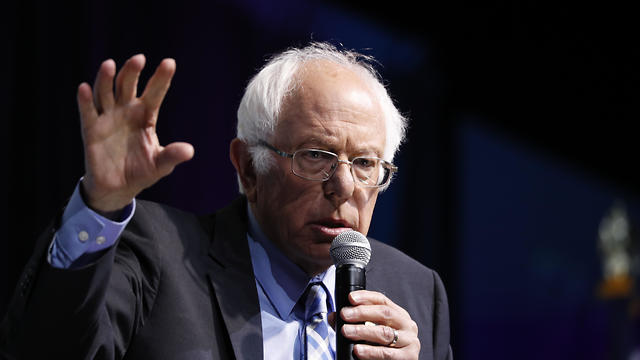
Five Democratic presidential candidates addressed thousands of attendees on Sunday and Monday at the national conference of J Street, founded in 2007 as a liberal counterweight to Washington advocacy that its leaders saw as aligning U.S. policymakers with the Israeli government exclusively enough to limit the prospects for meaningful peace with Palestinians.
The candidates’ attendance — in addition to videos sent to J Street by five other hopefuls who could not attend — underscores the importance of the Democratic-leaning Jewish-American voting bloc.
President Donald Trump’s long embrace of Benjamin Netanyahu has helped the conservative Israeli prime minister as Netanyahu battles for his political survival amid two deadlocked elections and a looming indictment threat.
But the Trump-Netanyahu alliance has also strengthened J Street’s case for Democrats to stand against the Israeli leader’s pursuit of settlement expansion and annexation in the West Bank.
So far, at least three Democrats vying to replace Trump — Pete Buttigieg, Elizabeth Warren and Bernie Sanders — have said they would consider using U.S. aid to Israel to help press its government to take a less hawkish tack.
Buttigieg, the mayor of South Bend, Indiana, said Monday at the conference that U.S. support for Israel should not “turn into a go-ahead where we would be endorsing anything like annexation.”
He took a slightly more measured approach about whether U.S. aid to Israel should be used to help curtail its settlement expansion, which has risen under Trump.
The prominence of the Democratic debate over how to pressure Israel marks a victory for J Street, which this week launched a push to add “formal opposition to Israel’s ongoing occupation of the West Bank” to the Democratic Party’s 2020 platform.
Separately, the establishment liberal group Center for American Progress released recommendations Friday for a “progressive policy alternative” that include conditions on U.S. aid to Israel.
Yet the ascendance of Jewish American progressive organizing under Trump isn’t limited to J Street’s agenda, with newer groups gaining ground to its left, including some that focus on domestic issues.
As Trump mobilizes his base by calling Jewish Democrats “disloyal” to their faith and to Israel, however, the group’s core argument — that Jews can support their faith and Israel while criticizing the Israeli government — has resonated more widely, according to J Street President Jeremy Ben-Ami.
Trump’s polarizing effect makes it “easy to understand” that criticizing a U.S. leader is not the same as anti-Americanism, Ben-Ami said in an interview. “The same thing goes for Israel.”
Buttigieg made a nearly identical case during his Monday remarks, saying that just as “deeply patriotic” Americans can still criticize Trump, they can be “committed to the U.S.-Israel alliance” while not signing onto every “individual policy choice by a right-wing government.” Warren said the same in a video message to the conference.
Sanders, a vocal advocate for using U.S. aid as leverage to help bring Israel-Palestinian relations closer to peace, was more direct: “It is not anti-Semitism to say that the Netanyahu government has been racist,” he told the conference.
After Sanders similarly derided the Israeli government earlier this year, a Cabinet member in Netanyahu’s party pushed back in an interview with an Israeli TV station, defending its voters’ choice of conservative leadership.
Michael Koplow, policy director of the more centrist Israel Policy Forum, said that Trump’s “deep unpopularity with American Jews has translated to a more critical attitude toward Israel.”
But he chalked that up less to a Trump-inspired impetus to criticize Netanyahu and more to the two men’s closeness.
“I think people who dislike President Trump tend to project that dislike onto Netanyahu and the Israeli government,” Koplow said.
But Jewish Americans, who polls show favor Democrats, are not in agreement when it comes to Trump’s Israel-Palestinian policies: A Pew Research Center poll conducted in April found that 42% of them said Trump is favoring the Israelis too much and 47% said he’s striking the right balance, while just 6% said he’s favoring the Palestinians too much.
For all the momentum behind a Democratic discussion about conditioning U.S. aid to Israel, the idea counts limited support from the party’s left wing in Congress, including pro-Sanders Reps. Ilhan Omar of Minnesota and Rashida Tlaib of Michigan.
Two other presidential candidates who spoke at the J Street conference, Sens. Amy Klobuchar of Minnesota and Michael Bennet of Colorado, declined to endorse the option, while a third, former U.S. Housing Secretary Julián Castro, de-emphasized it.
And the political clout of the American Israel Public Affairs Committee, the capital’s long-standing and more bipartisan vehicle to promote U.S.-Israel partnership, remains strong.
In addition, some Jewish American leaders who share J Street’s opposition to settlement construction and annexation — not to mention its support for an Israeli and Palestinian state co-existing in the region — are not convinced that discussing contingencies on U.S. aid alone is the best way to achieve those goals.
Rabbi Rick Jacobs, president of the Union for Reform Judaism, said in an interview that it’s important to communicate that “Israel’s safety and security are not mild or passing constraints.” Jacobs added that he welcomes a “robust debate” on Democrats’ approach to Israel that he described as in its early stages.
As that debate grows louder in the U.S. presidential campaign, with Netanyahu’s political future hanging in the balance, J Street will also continue to get its pressure from more left-leaning Jewish American groups that want to see more than rhetoric standing against Israeli policies that have undercut relations with Palestinians.
“If there is a Democratic president in (2021),” said Emily Mayer, political director of the liberal Jewish American group IfNotNow, “the question will be on the table of not only how will they reverse the damage Trump has done ... but also, how would they go beyond what Obama did?”
Associated Press religion coverage receives support from the Lilly Endowment through the Religion News Foundation. The AP is solely responsible for this content.



















